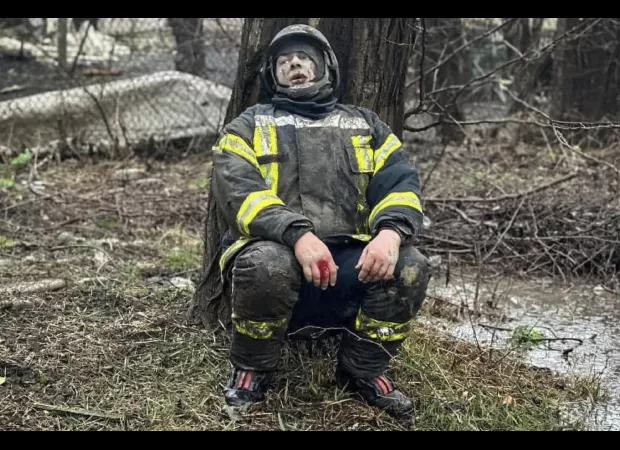A paramedic died along with at least 20 others in a Russian bombing attack in Ukraine.
Emergency personnel in Odesa, Ukraine were struck by a missile while rescuing victims from a bombed home.

A rescuer, his hand covered in blood and his face blackened with ash, was seen at the scene of the bombings in Odesa, Ukraine. The emergency services team had been hit by a Russian missile while trying to save people from a house that had been bombed. Tragically, 20 people lost their lives in the early hours of Friday, including a paramedic and an emergency service worker. As the rescuers worked tirelessly to clear the rubble and put out the flames caused by the missile strikes, they had to wrap the bodies of the victims in foil blankets.
The attacks, which were carried out by an Iskander-M missile, also injured 75 people and caused significant damage to at least 10 homes, according to reports from Ukraine's Emergency Service and regional governor, Oleh Kiper. Nine of those injured are currently in serious condition at the hospital. The emergency service workers, who were seen battling the fires sparked by the missiles, were visibly exhausted and covered in ash. It was a devastating scene.
The strikes not only caused loss of life, but also damaged vital civilian infrastructure, including gas and electricity supply and communication systems. This has left the city in a state of chaos and despair. The emergency responders knew that their job was dangerous, but they never expected to be targeted in what is known as a "double tap" attack, where a second missile is fired at the same location, specifically aimed at hitting rescuers.
Kiper, while describing the attack as "very mean" and carried out by "scum", declared a day of mourning on Saturday as the search for survivors continued. This was the second such observance in less than two weeks. The governor also took to Telegram to express his condolences to the families of the victims and wished a speedy recovery to all those who were injured. In the wake of the tragedy, locals rushed to donate blood, while President Zelenskiy promised a "fair response" from Ukraine's defence forces.
Known for its beautiful beaches and bustling city life, Odesa is a popular tourist destination on the Black Sea coast of southern Ukraine. However, the ongoing war has taken a toll on the city, with its streets filled with 19th and 18th century buildings now being destroyed by missile attacks. Even during this turmoil, the city continues to attract visitors from across Ukraine who seek solace in the warm sea breeze, despite the beaches being closed off due to debris and explosives from previous attacks.
As Ukraine's main port, Odesa has become a prime target in Russia's drone and missile warfare. In March, a Russian drone struck a multi-storey building, killing 12 people, including five children. Since then, the attacks have only intensified, with the invading country launching multiple rounds of missiles and Iranian-made drones towards the city. Residents have had to take shelter for hours at a time, as the air defences were put to the test and buildings shook under the impact of the attacks. The city's port infrastructure, which is crucial for Ukraine's war effort and economy, has been a primary target for these strikes.
The attacks have also affected the city's main export, grain, as transportation through the port has been disrupted since the full-scale invasion by Russia in February 2022. The port and surrounding facilities were part of an agreement between Russia and Ukraine, brokered by Turkey last year, to facilitate the export of grain. Despite these trade ties, Russian remains the most widely spoken language in Odesa, as it has been a popular destination for Russian tourists since the time of Catherine the Great. However, since the annexation of Crimea in 2014, the city has seen a decline in Russian visitors. In fact, even the Orthodox cathedral, which was almost destroyed by Russian strikes in July, is still owned by the Moscow Patriarchate of the Orthodox Church.
14 Views






